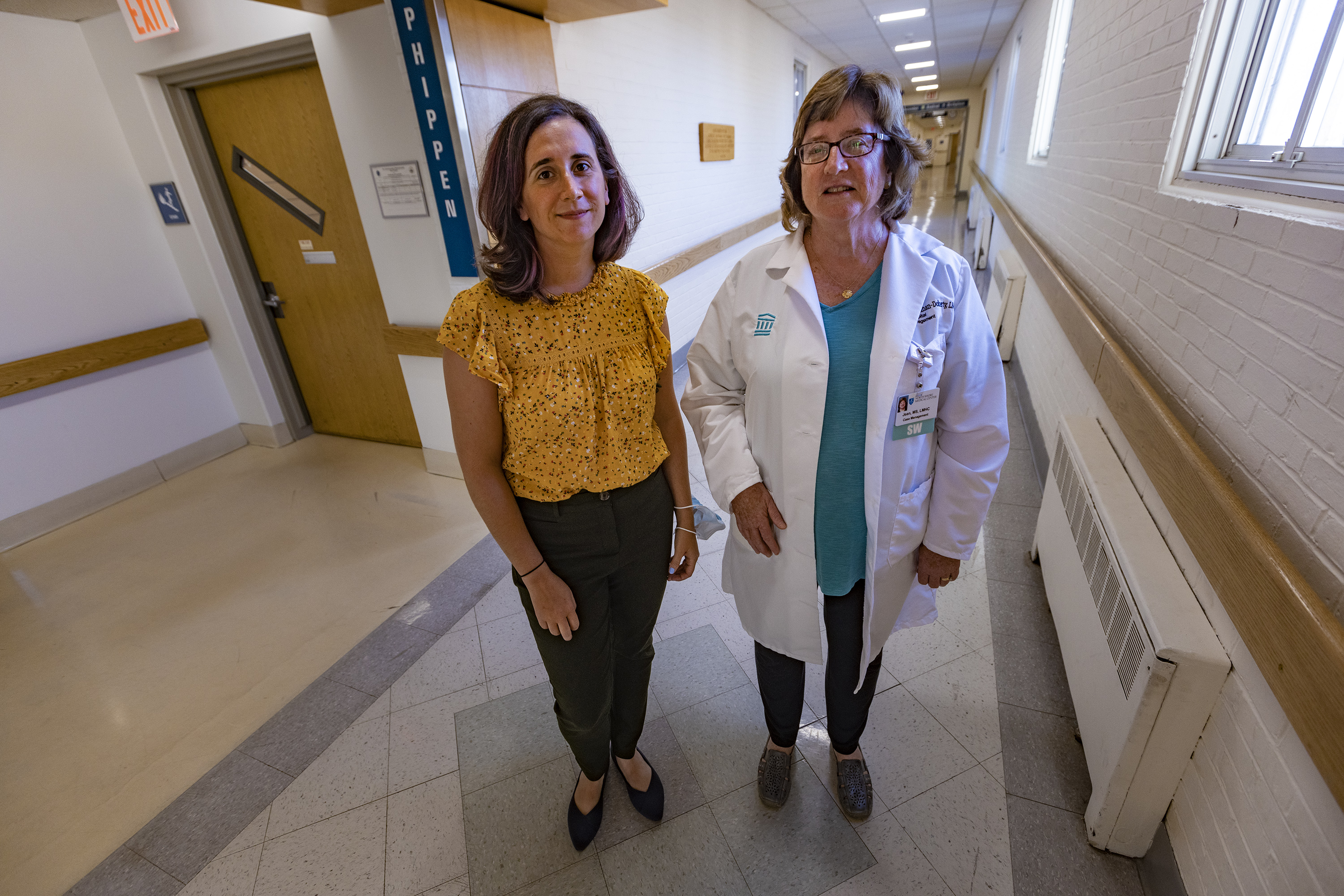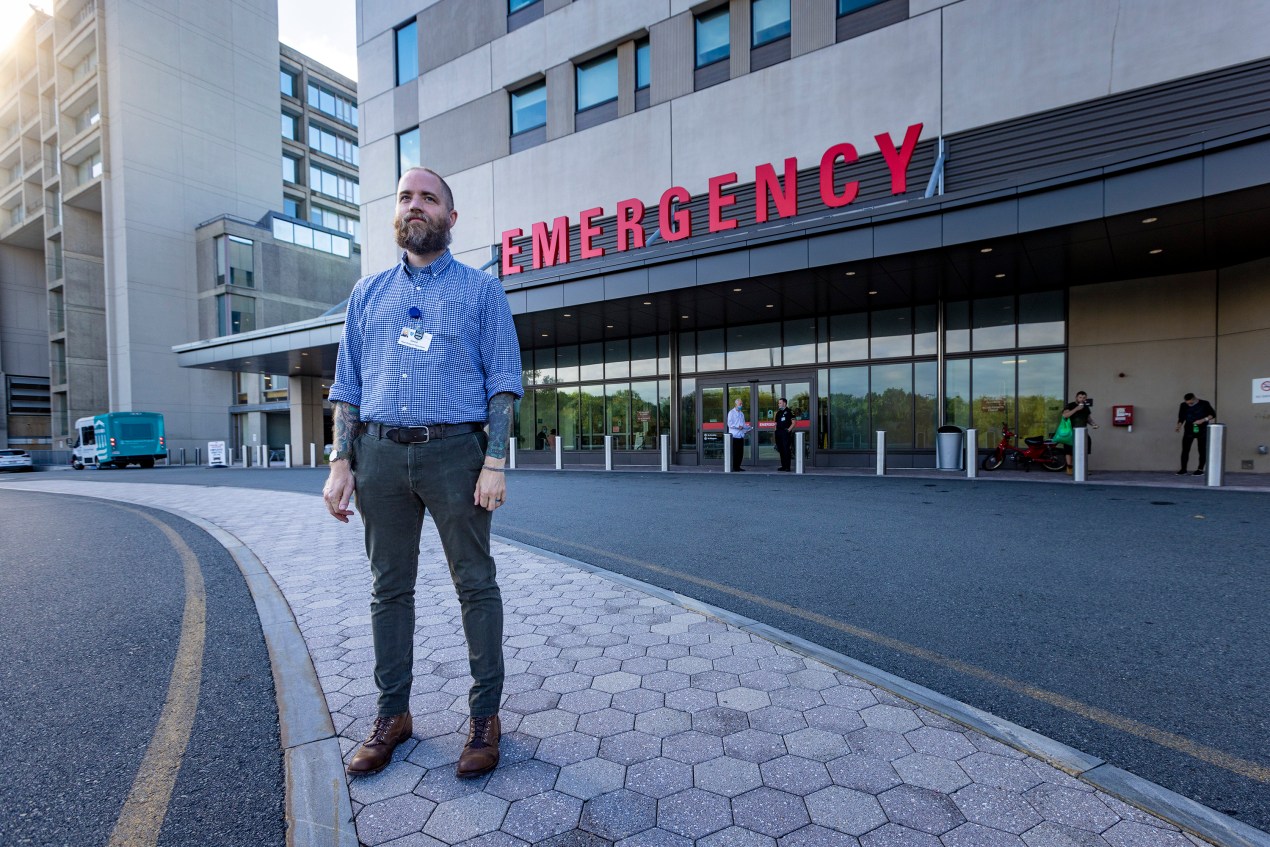In December, Marie, who lives in coastal Swampscott, Massachusetts, began having trouble breathing. Three days after Christmas, she woke up gasping for air and dialed 911.
“I was so scared,” Marie said later, her hand clutched to her chest.
Marie, 63, was admitted to Salem Hospital, north of Boston. The staff treated her chronic obstructive pulmonary disease, a lung condition. A doctor checked on Marie the next day, said her oxygen levels looked good, and told her she was ready for discharge.
We are not using Marie’s last name because she, like 1 in 9 hospitalized patients, has a history of addiction to drugs or alcohol. Disclosing a diagnosis like that can make it hard to find housing, a job, and even medical care in hospitals, where patients with an addiction might be shunned.
But talking to the doctor that morning, Marie felt she had to reveal her other medical problem.
“‘I got to tell you something,’” Marie recalled saying. “‘I’m a heroin addict. And I’m, like, starting to be in heavy withdrawal. I can’t — literally — move. Please don’t make me go.’”
At many hospitals in Massachusetts and across the country, Marie would likely have been discharged anyway, still in the pain of withdrawal, perhaps with a list of local detox programs that might provide help.
Discharging a patient without specialized addiction care can mean losing a crucial opportunity to intervene and treat someone at the hospital. Most hospitals don’t have specialists who know how to treat addiction, and other clinicians might not know what to do.
Hospitals typically employ all sorts of providers who specialize in the heart, lungs, and kidneys. But for patients with an addiction or a condition related to drug or alcohol use, few hospitals have a clinician — whether that be a physician, nurse, therapist, or social worker — who specializes in addiction medicine.
That absence is striking at a time when overdose deaths in the U.S. have reached record highs, and research shows patients face an increased risk of fatal overdose in the days or weeks after being discharged from a hospital.
“They’re left on their own to figure it out, which unfortunately usually means resuming [drug] use because that’s the only way to feel better,” said Liz Tadie, a nurse practitioner certified in addiction care.
In fall 2020, Tadie was hired to launch a new approach at Salem Hospital using $320,000 from a federal grant. Tadie put together what’s known as an “addiction consult service.” The team included Tadie, a patient case manager, and three recovery coaches, who drew on their experiences with addiction to advocate for patients and help them navigate treatment options.
After Marie asked her doctor to let her stay in the hospital, he called Tadie for a bedside consultation.
Tadie started by prescribing methadone, a medication to treat opioid addiction. Although many patients do well on that drug, it didn’t help Marie, so Tadie switched her to buprenorphine, with better results. After a few more days, Marie was discharged and continued taking buprenorphine.
Marie also continued seeing Tadie for outpatient treatment and turned to her for support and reassurance: “Like, that I wasn’t going to be left alone,” Marie said. “That I wasn’t going to have to call a dealer ever again, that I could delete the number. I want to get back to my life. I just feel grateful.”
Tadie helped spread the word among Salem’s clinical staff members about the expertise she offered and how it could help patients. Success stories like Marie’s helped make the case for addiction medicine — and helped unravel decades of misinformation, discrimination, and ignorance about patients with an addiction and their treatment options.
The small amount of training that doctors and nurses get is often unhelpful.
“A lot of the facts are outdated,” Tadie said. “And people are trained to use stigmatizing language, words like ‘addict’ and substance ‘abuse.’”
Tadie gently corrected doctors at Salem Hospital, who, for example, thought they weren’t allowed to start patients on methadone in the hospital.
“Sometimes I would recommend a dose and somebody would give pushback,” Tadie said. But “we got to know the hospital doctors, and they, over time, were like, ‘OK, we can trust you. We’ll follow your recommendations.’”
Other members of Tadie’s team have wrestled with finding their place in the hospital hierarchy.
David Cave, one of Salem’s recovery coaches, is often the first person to speak to patients who come to the emergency room in withdrawal. He tries to help the doctors and nurses understand what the patients are going through and to help the patients navigate their care. “I’m probably punching above my weight every time I try to talk to a clinician or doctor,” Cave said. “They don’t see letters after my name. It can be kind of tough.”
Naming addiction as a specialty, and hiring people with specific training, is shifting the culture of Salem Hospital, said social worker Jean Monahan-Doherty. “There was finally some recognition across the entire institution that this was a complex medical disease that needed the attention of a specialist,” Monahan-Doherty said. “People are dying. This is a terminal illness unless it’s treated.”

This approach to treating addiction is winning over some Salem Hospital employees — but not all.
“Sometimes you hear an attitude of, ‘Why are you putting all this effort into this patient? They’re not going to get better.’ Well, how do we know?” Monahan Doherty said. “If a patient comes in with diabetes, we don’t say, ‘OK, they’ve been taught once and it didn’t work, so we’re not going to offer them support again.’”
Despite lingering reservations among some Salem clinicians, the demand for addiction services is high. Many days, Tadie and her team have been overwhelmed with referrals.
Four other Massachusetts hospitals added addiction specialists in the past three years using federal funding from the HEALing Communities Study. The project is paying for a wide range of strategies across several states to help determine the most effective ways to reduce drug overdose deaths. They include mobile treatment clinics; street outreach teams; distribution of naloxone, a medicine that can reverse an opioid overdose; rides to treatment sites; and multilingual public awareness campaigns.
It’s a new field, so finding staff members with the right certifications may be a challenge. Some hospital leaders say they’re worried about the costs of addiction treatment and fear they’ll lose money on the efforts. Some doctors report not wanting to initiate a medication treatment while patients are in the hospital because they don’t know where to refer patients after they’ve been discharged, whether that be to outpatient follow-up care or a residential program. To address follow-up care, Salem Hospital started what’s known as a “bridge clinic,” which offers outpatient care.
Dr. Honora Englander, a national leader in addiction specialty programs, said the federal government could support the creation of more addiction consult services by offering financial incentives — or penalties for hospitals that don’t embrace them.
At Salem Hospital, some staffers worry about the program’s future. Tadie is starting a new job at another hospital, and the federal grant ended June 30. But Salem Hospital leaders say they are committed to continuing the program and the service will continue.
This story is part of a partnership that includes WBUR, NPR and KHN.







